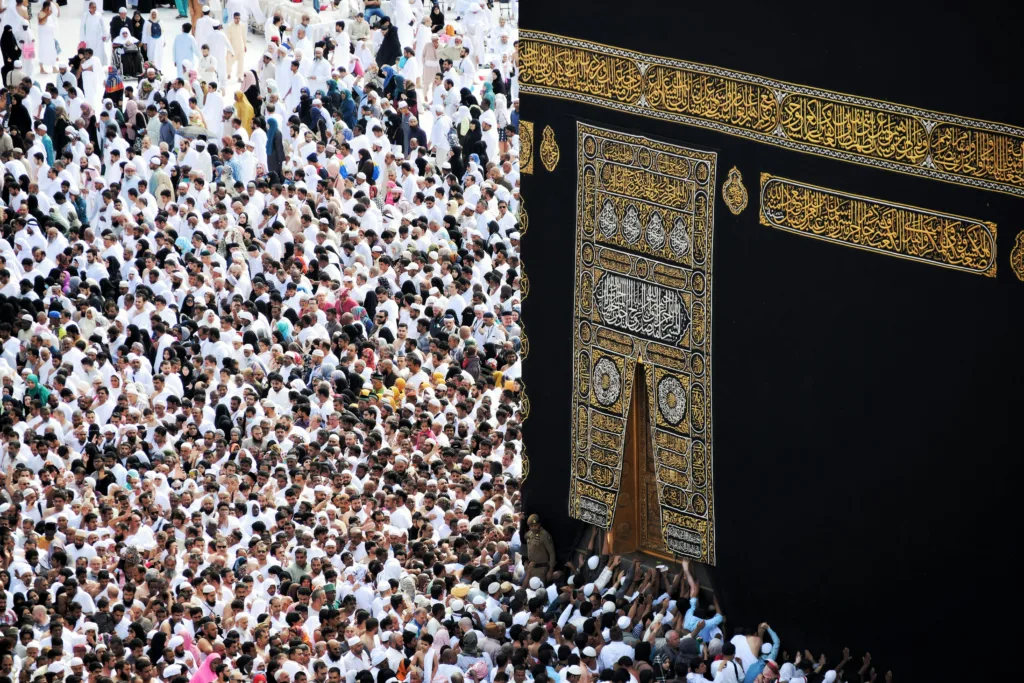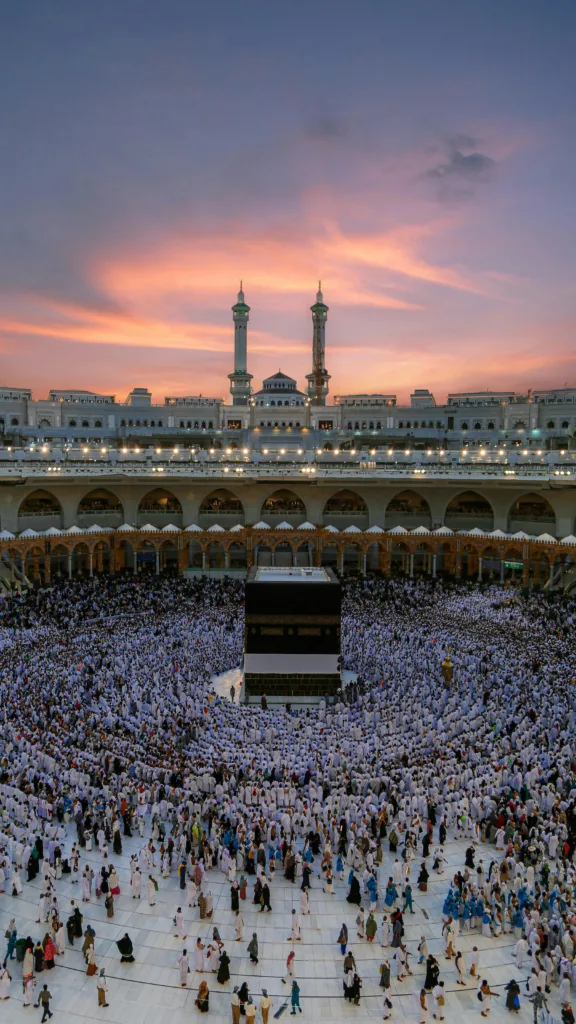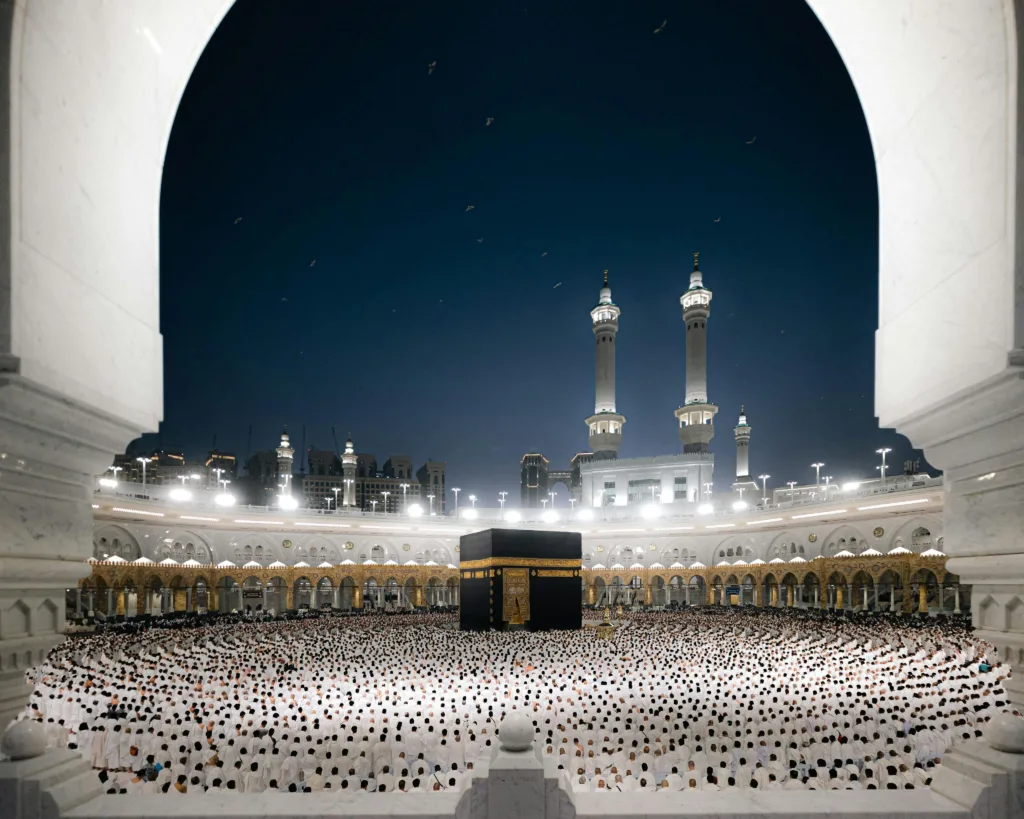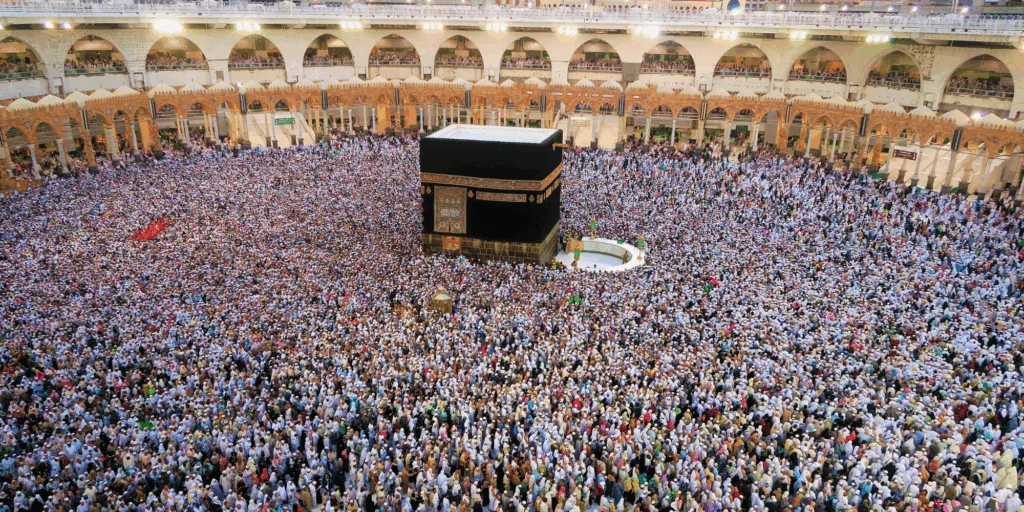Every year, millions of Muslims from around the world embark on a deeply spiritual journey known as Hajj—one of the five pillars of Islam and a profound example of how faith and travel come together in powerful ways. Held annually in the holy city of Mecca, Saudi Arabia, Hajj is more than a religious obligation. It’s a once-in-a-lifetime experience for many Muslims that represents spiritual renewal, global unity, and personal sacrifice.
Hajj is required of all Muslims who are physically and financially able to make the journey, and it must be performed at least once in a lifetime. The pilgrimage takes place during the Islamic month of Dhul Hijjah. It commemorates the trials and faith of the Prophet Ibrahim (Abraham), his wife Hajar (Hagar), and their son Ismail (Ishmael). It includes a series of sacred rites such as circling the Kaaba, standing at Mount Arafat, and performing symbolic prayers of purification and devotion. These acts symbolize unity, humility, and the believer’s devotion to God. For many Muslims, completing the Hajj is one of the most meaningful and transformative experiences of their lives.
This awe-inspiring gathering is one of the largest annual events in the world, with approximately 2 to 3 million pilgrims participating each year. Hajj and travel are immensely intersected—from the logistics of transporting millions of pilgrims to the specialized services that make the journey possible. Travel professionals and agencies play a vital role in facilitating one of the most sacred journeys in the Islamic faith.
A Sacred Journey Fueled by Travel
Hajj is one of the most prominent forms of religious travel in the world. Unlike leisure or business travel, this pilgrimage is driven by a deep spiritual calling. Pilgrims prepare mentally, emotionally, and physically for this once-in-a-lifetime journey, often saving for years to make it possible. While the destination—Mecca—is fixed, the journey varies greatly, with pilgrims coming from every continent. This global movement highlights how travel serves as a bridge between faith and action.
For many Muslims, the act of traveling to Mecca is as meaningful as the acts of worship themselves. Leaving behind the comforts of home, navigating unfamiliar environments, and joining millions of others on the same spiritual path fosters a deep sense of humility and unity. The journey is a powerful reminder of life’s greater purpose and emphasizes the equality of all believers, regardless of nationality or status. In this way, Hajj transforms travel into a sacred experience that transcends borders and reinforces the spiritual bonds shared across the global Muslim community.
Global Mobility and Logistics on a Massive Scale
Facilitating the movement of millions of people to one location within a short time frame requires extensive travel infrastructure. From flights and visas to transportation between sacred sites in Saudi Arabia, the logistics of Hajj are staggering. The Saudi government works closely with international airlines, local ground operators, and tour providers to manage crowds, ensure safety, and maintain order. Travel agencies and tour operators play an essential role in coordinating these elements for pilgrims, helping them navigate complex requirements and cultural nuances.
Over the years, managing this large-scale movement has led to the implementation of sophisticated systems. Digital Hajj permits, electronic wristbands, and crowd control technologies enhance safety and efficiency. Special flight schedules, designated pilgrimage routes, and infrastructure upgrades—such as expanded airport terminals and high-speed rail lines—are tailored specifically to accommodate the surge in travelers during the Hajj season. These efforts underscore how the pilgrimage drives advancements in travel planning and logistics, making Hajj a remarkable feat of global coordination.



Specialized Hajj Travel Services and Packages
Hajj is highly structured, with specific rituals and a tight schedule that must be followed. As a result, most pilgrims book Hajj packages through authorized travel providers that include airfare, visa assistance, accommodations near Masjid al-Haram, local transportation, and religious guides. These packages are often curated to accommodate different budgets and levels of comfort, from economy to luxury. This is a prime example of how the travel industry serves a niche but vital market with tailored experiences rooted in cultural and religious expertise.
An important component of these Hajj packages is the involvement of local imams, scholars, and community leaders, who often organize and lead groups from their mosques or Islamic centers. These leaders provide spiritual guidance, educational sessions, and on-the-ground support throughout the pilgrimage, ensuring that participants understand and correctly perform each ritual. Their presence offers pilgrims a sense of familiarity and reassurance in a foreign environment, while also bringing a strong sense of community within the group. This blend of religious leadership and structured travel planning enhances the overall experience, making it both spiritually enriching and logistically smooth.
Cultural Exchange and Global Unity
One of the most remarkable aspects of Hajj is the diversity of the worshippers. People of every nationality, ethnicity, and language come together in a single location, united by shared beliefs and practices.
Amid the sea of white garments and sacred rituals, pilgrims often find themselves sharing meals, stories, and prayers with strangers who quickly become companions in faith. These encounters break down barriers of language and nationality, revealing the universal values that unite the Muslim ummah.
For many, the friendships and connections formed during Hajj continue long after the journey ends, serving as a reminder that Islam is a global faith that transcends borders. The pilgrimage becomes not only a spiritual milestone but also a profound lesson in empathy, humility, and human connection through the lens of travel. This creates an environment of global unity and mutual respect, often described by pilgrims as life-changing.
Economic and Tourism Impact
Hajj significantly contributes to Saudi Arabia’s economy, particularly within the hospitality, transportation, retail, and service sectors. Each year, millions of pilgrims generate billions in revenue through their use of accommodations, food services, flights, and local purchases. This sustained demand has positioned Hajj as a cornerstone of the Kingdom’s religious tourism industry. In addition to spiritual benefits, the pilgrimage supports thousands of jobs and small businesses, from hotel staff and bus drivers to tour operators and market vendors.
In response to this economic importance, Saudi Arabia has made substantial investments in tourism infrastructure and modernization efforts. These include the expansion of airports in Jeddah and Medina, high-speed rail lines connecting holy sites, the development of high-capacity hotels near Masjid al-Haram, and the implementation of smart technologies for crowd control and safety. The government’s ongoing efforts to enhance the pilgrim experience reflect a broader vision of positioning Saudi Arabia as a leader in religious tourism, showcasing how Hajj serves as both a sacred rite and a driver of national development.
The Hajj pilgrimage illustrates that travel is not only about places—it’s also about purpose. It showcases how the travel industry can support deeply meaningful journeys through thoughtful planning, cultural sensitivity, and logistical excellence. For travel professionals, understanding Hajj means recognizing the profound role travel plays in connecting people to their faith, their global community, and to transformative life experiences.
As the world of travel continues to evolve, so will the ways we support sacred journeys like Hajj with greater inclusivity, innovation, and respect.
If you’re a travel advisor looking to serve faith-based travelers or expand into niche markets like religious tourism, understanding the logistics and cultural significance of journeys like Hajj is essential. By offering specialized support, curated packages, and culturally informed service, you can provide immense value to your clients while tapping into a deeply purposeful and growing segment of the travel industry. Now is the time to explore how your agency can play a meaningful role in facilitating spiritual journeys that truly transform lives.


